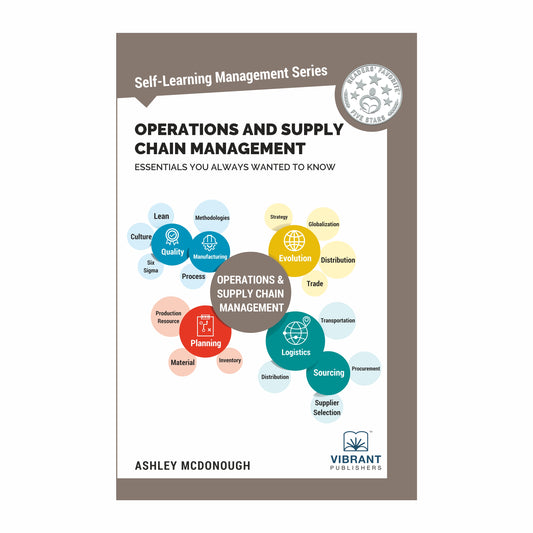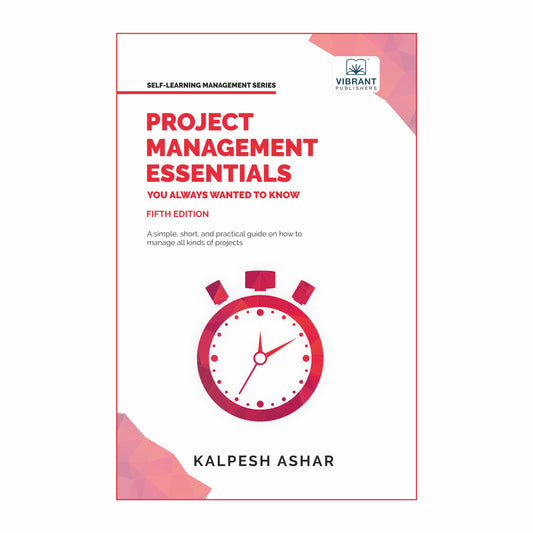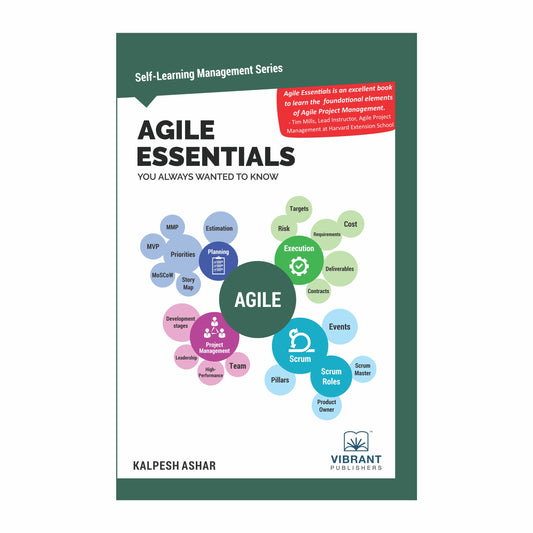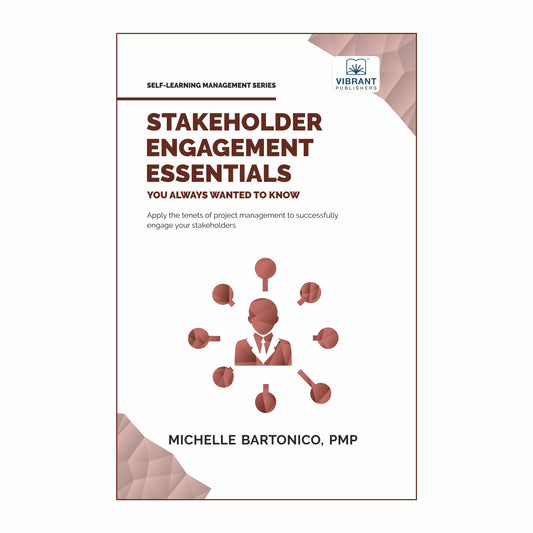Introduction
‘Project management’ and ‘Agile’ are buzzwords in corporate circles today. As organizations make the move towards working smart and not just working hard, the need to ensure that projects flow smoothly takes center stage. Today, project management terminology like ‘agile’ and ‘scrum’ are known to almost every corporate manager and employee. (At Vibrant, too, we recently had an interesting training session on project management, held by the author of the same book—Mr. Kalpesh Ashar). As the workplace evolves and transitions into a seamless mix of hybrid work, shorter workdays, and changing practices, project management is no longer a luxury—it’s a necessity.
In this blog, we’ll look at what project management and Agile are and the numerous careers available in these fields. We’ll also take a look at Kalpesh Ashar’s exciting books, Project Management Essentials You Always Wanted To Know and Agile Essentials You Always Wanted To Know. Read on to get a taste of the disciplines that makes work easy, fun, and profitable beyond measure.
Quick links in this blog:
Introduction
What is Project Management?
Explore Exciting Careers in Project Management
About Project Management Essentials You Always Wanted To Know
What is Agile?
Explore Dynamic Careers in Agile
About Agile Essentials You Always Wanted To Know
End Note
What is Project Management?
According to the Project Management Institute (PMI), “Project management is the use of specific knowledge, skills, tools, and techniques to deliver something of value to people.” The main aim of project management is to create and deliver something of value to the customer. However, traditional ways of managing projects often contained unnecessary wastages of time and effort and contained loopholes that prevented the project from being 100% productive in value.
When modern project management came into the picture, it changed the way projects were traditionally looked at and handled. Now, with concepts like Agile, Scrum, and Six Sigma, project management is no longer about the end-to-end completion of a project but ensuring that shorter project cycles are completed efficiently. This results in deliverables that are put together efficiently and are completely ready at the time of final delivery.
Now that we’ve seen what project management looks like in the modern world, let’s explore the careers that this field offers.
Explore Exciting Careers in Project Management
Project management professionals are in demand today because of the ever-changing requirements of the workplace and the need to accomplish work in a quick, efficient, and optimal manner. According to the Project Management Institute, employers will need to fill nearly 2.2 million new project-oriented roles each year through 2027. Project managers, project team leads, and resource managers, for example, are just a few of the options available for enthusiastic project management professionals.
Project Manager
Most people who take up project management certifications do so with the intention of becoming project managers. Project managers are responsible for managing the entire life-cycle of a project, right from defining the goals of the project and setting deadlines to allocating resources and monitoring the execution of work at every stage. They guide the team through the stages of the project, ensuring that the work is completed as per the requirements. Project managers are in demand in several industries like construction, healthcare, I.T, and the government, for example.
Project Coordinator
This role is ideal for those just starting to work in this field. Project coordinators assist project managers and usually specialize in the role of project budgeting and funding. They are responsible for devising strategies for projects and handling the coordination among various departments to ensure that things move smoothly. This role requires resource coordination and monitoring of team members to keep the work progress on track. Project coordinators also handle the paperwork-related aspects of the project.
Project Management Consultant
This role involves planning, advising, and supervising the team members to ensure that they achieve the desired goals of the project. A project management consultant seeks to improve the project management process, coming up with process improvements and conceptualizing solutions to roadblocks and challenges. They are responsible for implementing the plans for the projects and ensuring that the project is completed according to the plans, as well as identifying potential risks and coming up with ways to address these risks. They usually handle several projects at a single point in time.
Project Team Lead
A project team lead, as the name suggests, guides and motivates the team members of the project. Project team leads create and structure teams and resolve interpersonal conflicts that may arise. They organize teams, conduct meetings, assign roles and responsibilities, and are tasked with ensuring that the vision for the project is accomplished. Although this role sounds similar to that of a project manager, the major difference is that project team leads are more focused on managing the team members of a project and not just the project as a whole, as in the case of a project manager.
Resource Manager
Resource managers work under project managers and are responsible for hiring and allocating human resources to work on projects. They monitor the workload of employees and work alongside the human resource department of an organization to provide training, compensation, and documentation of resources working on projects. They assess the capacity of a company to satisfy staffing requirements for projects and work on hiring and/or allocating new resources to projects when the need arises.
Business Analyst
A business analyst acts as a consultant between the project management team and the client. They make sure that the client’s requirements are being fulfilled and negotiate with the project manager to find the best possible solution for their client. Business analysts also provide guidelines for the project, conduct trade-off and risk analyses, and undertake a cost-benefit analysis to determine the scope of the project.
About Project Management Essentials You Always Wanted To Know
So, how do you go about getting a job in project management? Before you embark on a certification, it’s great to learn and understand all you can about the fundamental practices of this field. That’s where Project Management Essentials You Always Wanted To Know can help. It reflects the dynamic nature of projects in the 21st-century and acts as a guide to understanding how to efficiently manage the complexities of modern-day projects. This book takes the learner through the entire life-cycle of the project, explaining the foundational stages of project management, such as project initiation, project planning and budgeting, project execution, project monitoring and controlling, and project closure. The book explores the best practices in the field of project management and explains how budding project managers, team leaders, and supervisors can practically apply the concepts in this book to optimize their projects.
Interested in learning about the world of project management? Order Project Management Essentials You Always Wanted To Know here!
What is Agile?
Now, let’s take a look at an important sub-field of project management. Agile is an offshoot of project management, and yet is, in some respects, an entire discipline of its own. It has completely changed the way projects are handled in the modern-day workplace. It uses an iterative approach while planning and managing projects so that projects are completed faster and with lesser delays and wastage of time and effort. Agile focuses on an incremental approach to projects. Instead of viewing the project as an aggregate, sum total of work to be done and planned for, it looks at the ways the work can be broken down into smaller increments that are then completed in shorter cycles. This ensures that the resources working on the project have enough time for rework so that as each successive part of the project is completed, the deliverables can be sent out and that stage of the project shelved.
Explore Dynamic Careers in Agile
Today, the demand for Agile careers like Agile Coach and Scrum Master is increasing rapidly. As companies realize the benefits of managing projects based on agile frameworks, the scope of careers in this field is widening. Let’s look at some of the most popular Agile careers.
Scrum Master
A scrum master acts as a facilitator who coaches the team members in the Scrum methodology and ensures that they follow the processes and procedures properly. The scrum master is not in charge of the project or the development team. He or she is responsible for improving the project process and making changes wherever necessary so that the project workflow is executed smoothly. Scrum Masters conduct daily stand-up meetings, assist the product owner with the product backlog, and remove roadblocks that are impeding the progress of individual members’ work.
Agile Coach
The responsibility of an Agile coach is to act as a mentor and teach team members the Agile process and its methodologies. Agile coaches train the team in the implementation of Agile processes and the management of specific stages of the product lifecycle. They train and assist product owners in writing user stories and mentor scrum masters. The role of an Agile coach is wider than that of a scrum master and addresses the larger dimensions of the project.
Agile Process Consultant
Agile process consultants make use of their expertise to provide solutions to problems that arise in the operation of projects. They formulate action plans for projects and strategies to implement and resolve issues. They also provide constant feedback and ensure that the project is being executed without any obstacles. Agile process consultants are usually contracted by organizations for a certain period of time to help them meet project objectives.
Product Owner
The product owner is the leader of the project and an important part of the scrum team. Product owners monitor the product development and set tangible goals for the team based on the vision they have for the project. They communicate with stakeholders and define set business objectives which have to be achieved by the team. They create a product roadmap and a strategic plan for the product, based on which the product backlog is decided. Product owners are in charge of the entire project and are tasked with the responsibility of supervising scrum masters, agile coaches, and team members.
About Agile Essentials You Always Wanted To Know
If that made you curious about what Agile is, you can read Agile Essentials You Always Wanted To Know. This comprehensive guide offers an exciting look into how the concepts and methodologies of Agile work. With this book, project managers and team leaders will be equipped with the core concepts and terminology they need to execute Agile methodologies such as Scrum. The book provides rich insights into Agile planning and execution, concepts like Kanban board and User Stories, and the characteristics of an Agile team that can lead organizations to success. This book is where readers will find all their questions about Agile answered.
Order Agile Essentials You Always Wanted To Know here and start applying the principles of Agile in your organization today.
End Note
Project Management today is not what it was 20, or 10, or even 5 years ago. Today, the scope of this field is changing and growing to include the demanding requirements of a modern-day workplace that functions on efficiency rather than on just the need to get things done. This field today is therefore attracting diverse talent that has the capacity and skills required to transform the way workplaces handle projects. Today, you cannot work in project management without being up-to-date on terminology and concepts like Agile and Scrum.
If you want more information on project management certifications, you can check out the Project Management Institute (PMI) here.
Read sample pages of Project Management Essentials here.
Read sample pages of Agile Essentials here.





